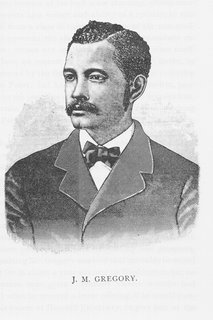Twelve Black Classicists
 The school where I teach is one of the few in the United States that still requires students to take Latin, four years of it, with many opting to take advanced classes on the literature of Ovid and Virgil. As a Latin-head myself, I always regret not having had to take Latin (and Greek) when I was in middle and high school. This was until very recent times recognized as an essential part of education, the indisputable sign of the learned person. So much so, as I learned in an exhibit of photographs recently displayed at my school, that freed American slaves fought for the right to learn ancient languages to demonstrate that they, too, were just as capable of intellectual pursuits as anyone else. (A senator in favor of segregation, John C. Calhoun, famously claimed that "no Negro can learn Greek.") As a result, Howard University -- the fine, historically black college here in Washington -- has to this day a strong Department of Classics, where the first African-American students and professors of Latin and Greek learned and taught.
The school where I teach is one of the few in the United States that still requires students to take Latin, four years of it, with many opting to take advanced classes on the literature of Ovid and Virgil. As a Latin-head myself, I always regret not having had to take Latin (and Greek) when I was in middle and high school. This was until very recent times recognized as an essential part of education, the indisputable sign of the learned person. So much so, as I learned in an exhibit of photographs recently displayed at my school, that freed American slaves fought for the right to learn ancient languages to demonstrate that they, too, were just as capable of intellectual pursuits as anyone else. (A senator in favor of segregation, John C. Calhoun, famously claimed that "no Negro can learn Greek.") As a result, Howard University -- the fine, historically black college here in Washington -- has to this day a strong Department of Classics, where the first African-American students and professors of Latin and Greek learned and taught.
This week, the Washington Post published an article (13 Black Classicists In Exhibit, February 2) by Michelle Betton about the exhibit at the school. Michele Valerie Ronnick, at Wayne State University, organized this exhibit, called 12 Black Classicists, a couple years ago. It has been shown in many venues, large and small. It is a simple collection of 13 photographs, but the background of what those images represent is quite moving. My favorite classicist in the exhibit is James Monroe Gregory, who came from slavery in Virginia to be the first black professor of Latin in the country, here at Howard. Also, William Sanders Scarborough was born into slavery in Macon, Georgia, in 1852. After emancipation, he studied Greek at Oberlin and was the first black member of the Modern Languages Association. Scarborough's Greek textbook was used widely throughout the United States. James Monroe Gregory wrote a biography of Frederick Douglass, for which Scarborough wrote the introduction.




















































No comments:
Post a Comment